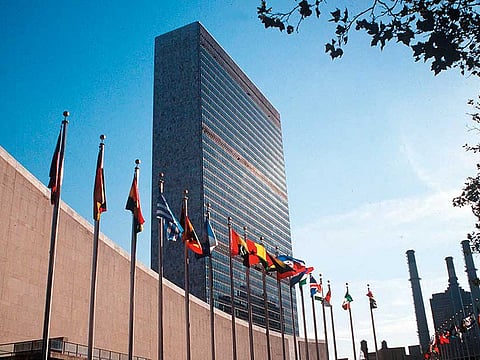Lebanon loses UN voting rights due to non-payment of dues
Lebanon is facing its worst economic crisis since the 1975-1990 civil war

Also In This Package
Damascus: Lebanon’s voting rights at the General Assembly have been temporarily suspended because of its failure to settle outstanding dues to the United Nations.
The announcement was made by UN spokesman Stephane Dujjaric, who said that a handful of other nations feel into the same category, like Somalia, Yemen, Venezuela, and Comoros.
Lebanon owes the UN a sum of $400,000 for two years of unsettled membership.
The decision to suspend the country’s voting rights at the UN has struck a raw nerve across Lebanon, where people have been on the streets for three months, protesting against corruption, theft, and misuse of public office.
Bassil under fire
Much of that public anger was levied against Foreign Minister Gibran Basil, who is in-charge of Lebanon’s relation with the UN.
The son-in-law of President Michel Aoun, Basil has been at his post since 2014. His ministry came out with a statement on Saturday morning, refusing to take blame for the temporary suspension, saying that the UN was responsible for what happened and that all necessary paperwork for the outstanding dues were ready at the Ministry.
“It is not unusual for the Lebanese government to have delays in its payments locally and internationally,” says Fadi Assaf, a Lebanese political risk consultant and co-founder of Middle East Strategic Perspectives.
Speaking to Gulf News, he added: “But this is the first time that Lebanon missed the payment of its UN membership fee. And this is quite unusual for Lebanon.
“Responsibilities are lost between the various political protagonists. The Ministry of Foreign Affairs is now “controlled” by the presidential camp and its allies while the Ambassador at the UN is “controlled” by the camp of the Prime Minister.
But the problem seems to be financial. According to sources, the Ministry of Finance (“controlled” by the Amal Movement) and the Central Babk did not respond on time to the Ministry’s requests. Whatever the reason, this is enough to fuel the sterile political debates in Lebanon.”
How is the UN funded?
The UN collects annual dues from all 193-member states, in the form of mandatory “contributions” to its general budget.
A nation’s gross national income is usually taken into account when determining how much it has to pay annually, along with its debt burden. Lebanon has a staggering public debt of $85 billion and is currently suffering a major banking crisis, which has led to 60 per cent devaluation of its currency, in just three months.
By Friday, four countries declared their annual contribution to the UN had been settled, being India ($23.3 million), Ukraine ($1.6 million), Portugal ($9.8 million) and Armenia ($96,000).
The US is the largest contributor to the UN, with an annual payment of $10 billion. It is followed by Germany, with $4 billion, then the UK, Japan, and China.
Where does that money go?
Much of that money goes to peacekeeping operations across the world, including Lebanon itself, which since 1978, has had a large number of UN troops stationed along its borders with Israel, known as the United Nations Interim Force in Lebanon (UNIFIL).
Between July 2018 and June 2019, the declared budget for UNIFIL stood at a whopping $474 million USD.
Lebanon has been a founding member state of the UN, since 1945. Then-Foreign Minister Charles Malek helped establish the international organisation at the end of World War II and played a pivotal role in drafting the Universal Declaration of Human Rights.
Since 1953, Lebanon has served twice as a non-permanent member of the Security Council and uses its position to advance its positions vis-a-vis the Israeli occupation of South Lebanon and the 1982 invasion of Beirut.
The United Nations has repeatedly complained that Lebanon has failed to comply with UNSCR 1701, which calls on it to disarm non-state players (in reference to Hezbollah) and to allow none other than the Lebanese Army to deploy near the border with Israel.
Sign up for the Daily Briefing
Get the latest news and updates straight to your inbox



